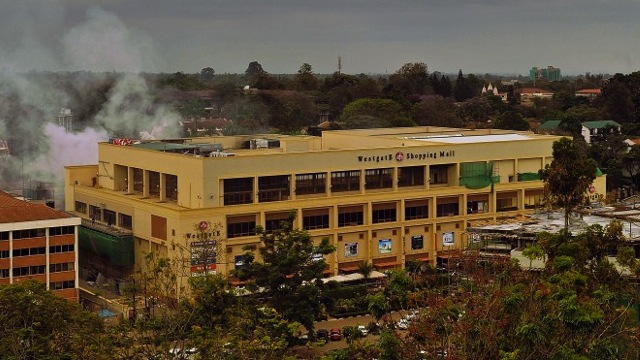SUMMARY
This is AI generated summarization, which may have errors. For context, always refer to the full article.

NAIROBI, Kenya (UPDATED) – Kenya’s President Uhuru Kenyatta announced Tuesday, October 1 a formal inquiry into apparent security lapses during the deadly assault on Nairobi’s Westgate mall by Islamists, in which at least 67 were killed.
As shopkeepers complained their stores in the upmarket shopping centre had been completely looted, Kenyatta announced an investigation into the security implications of the massacre claimed by the Shebab, an Al-Qaeda linked Somali group.
“We are putting in place a commission of inquiry to see if we could have done things better, to see if there were lapses,” Kenyatta said at inter-faith prayers led by leaders from the Muslim, Christian and Hindu communities.
Politicians from parliament’s national security and defense and foreign relations committees visited the mall on Monday afternoon, picking their way through shattered glass and pools of congealed blood in the main hall.
Thirty-nine people are still missing, according to the Red Cross, a week after Kenyan forces brought an end to the four-day bloodbath.
Kenyan and foreign investigators continue to comb the carcass of the mall for clues on the perpetrators and their operating methods.
Asman Kamama, the chairman of the parliamentary joint committee, said the team of lawmakers was expecting to quiz security chiefs on Thursday, October 3.
The probe is expected to last several weeks at least.
Former Prime Minster Raila Odinga, speaking at the memorial, warned the attack “shows we are in for a long, drawn-out battle”, and stressed the need to bolster security.
“Intelligence action not acted on serves no purpose,” Odinga said.
The Shebab has vowed more attacks if Kenya does not pull its troops out of Somalia but Kenyatta offered a defiant riposte.
“We will not be intimated, we will not be cowed,” Kenyatta said. “We will stay there until they bring order to their nation.”
Shops ransacked, goods stolen
Shopkeepers allowed back into the mall to check on their premises painted an apocalyptic scene, saying it stank of corpses and that the first floor of the mall was completely burned.
“There’s a really bad stench in there of the dead bodies and blood all over the place, that’s why they’re advising us to wear masks as we go in,” Pardeep Rehal, a bookstore owner, told Agence France-Presse.
Many shopkeepers accused the Kenyan forces of looting their stores.
“There is not one shop window that is still intact, everything has been looted,” another shopkeeper added.
A beauty salon employee said that shopkeepers had locked their premises when they were evacuated, but that since then virtually all shops had been looted.
“Cash boxes have gone, jewelry has gone and handbags are missing. I was unable to find mine,” she said.
Part of the rooftop parking of the mall collapsed after heavy explosions and a fierce fire, leaving the key area where the insurgents are understood to have made their final stand — along with possible hostages buried under tons of concrete slabs and rubble.
Meanwhile rights groups condemned comments by the lawmakers that they would also “rethink” Kenya’s hosting of some half a million Somali refugees, saying the camps – notably the word’s biggest such site, Dadaab – could be a “training ground” for Somali extremists.
Somali refugees in Kenya, many of whom themselves fled the Shebab, have expressed fears they will be targeted in reprisal raids.
“While protecting Kenyans from security threats is an urgent priority, Human Rights Watch is concerned about reports that some members of parliament have called for the closure of the Somali refugee camps in Kenya,” said HRW’s Gerry Simpson.
“These camps are currently home to over 400,000 refugees, including many forced to flee to Kenya because of Al-Shebab abuses. Forcing them back to a country still wracked by widespread violence and insecurity would not only breach Kenya’s obligations under international law, but could inflame further instability in Somalia.”
At the prayers, Kenyans gathered to mourn their losses.
“At times of problems we have to pray together at least to console one another,” Mustafa Gichuri, a 50-year-old electrician and a Muslim told Agence France-Presse.
Rupy Chana, a 37-year-old Sikh woman attending the prayers, echoed that it was “good to see” people from different faiths attending the prayers. – Rappler.com
Add a comment
How does this make you feel?
There are no comments yet. Add your comment to start the conversation.